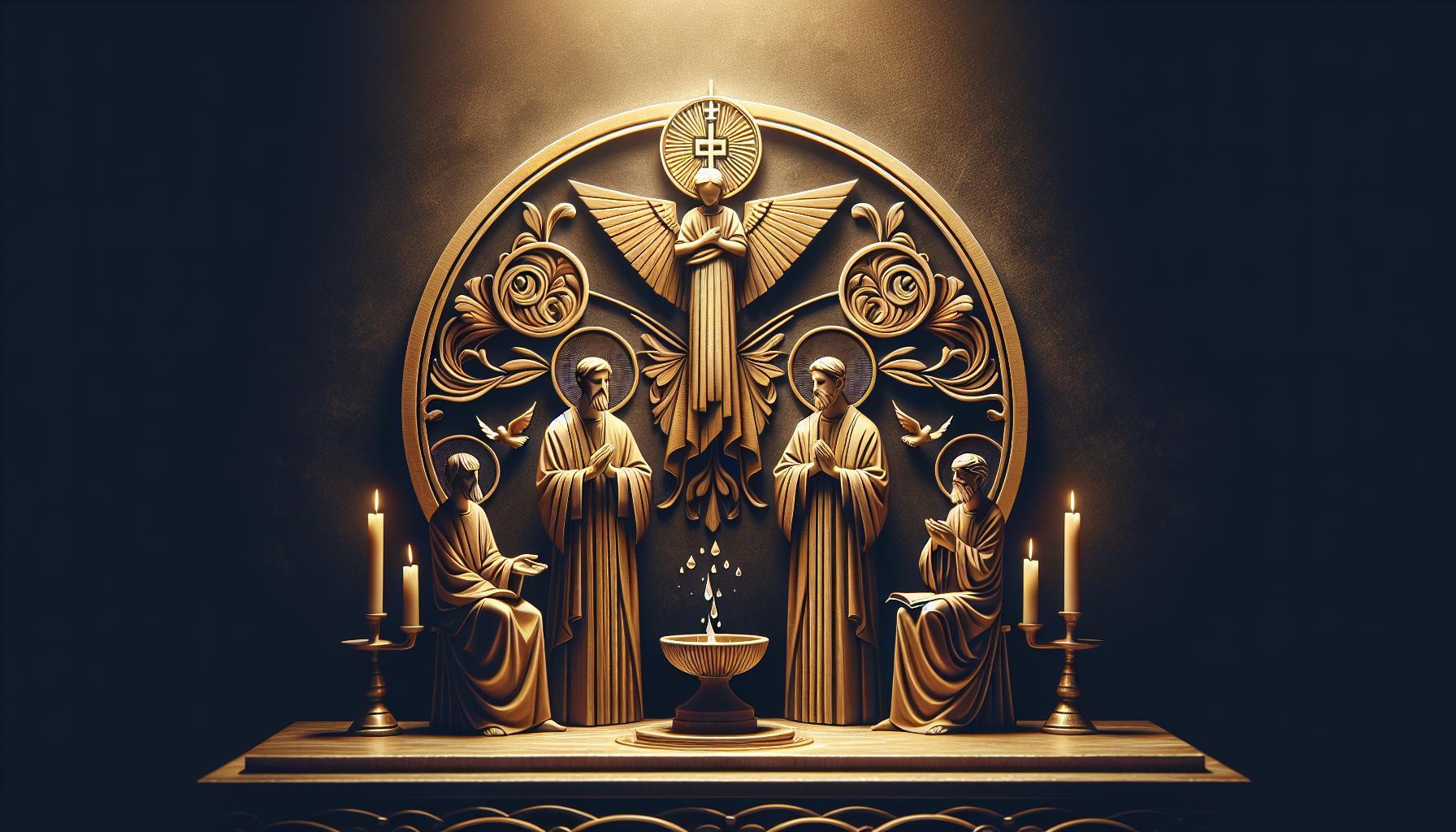Deciding to take the sacred step of baptism can be both exciting and daunting. As you prepare for this spiritual milestone, understanding practical steps and fostering inner readiness is essential. This guide will help you navigate the journey toward baptism, ensuring you embrace this transformative experience wholeheartedly.
Understanding the Sacrament: What Baptism Means in Different Faiths
The significance of baptism transcends mere ritual; it is a profound expression of faith and community among various religions. Understanding how baptism is perceived and practiced across different faiths illuminates its spiritual depth and the varied beliefs about initiation, cleansing, and commitment to a higher purpose. Whether viewed as a rite of passage, a symbol of salvation, or a communal bond, the act of baptism retains its significance in diverse spiritual contexts.
Baptism in Christianity
In Christianity, baptism is primarily seen as a sacrament—a sacred act of initiation into the faith. It is often linked to the teachings of Jesus Christ, who himself was baptized. In many Christian denominations, such as Catholicism and Orthodoxy, baptism involves water as a medium of renewal, signifying the washing away of sin and the birth of a new identity in Christ. In contrast, many Protestant branches approach baptism as an outward sign of an inward faith, focused more on personal acceptance of Christ rather than on the salvific aspect.
- Catholics and Orthodox Christians: Generally practice infant baptism, emphasizing the belief in original sin and the need for divine grace.
- Protestants: Often practice believer’s baptism, where individuals make a conscious decision to accept Christ before being baptized, usually as adolescents or adults.
- Baptists: Hold that baptism should only be performed on those who have professed their faith, completely immersing the individual in water.
Baptism in Other Faiths
Interestingly, the concept of baptism or its equivalent can be found in various other religions, albeit with differing meanings and practices. For example, in some sects of Hinduism, a ritual called *snana* or *purification* involves bathing in sacred rivers, which symbolizes the washing away of sins. Although not termed baptism, this practice provides a similar sense of spiritual renewal.
| Faith | Meaning of Baptism | Ritual Practices |
|---|---|---|
| Christianity | Initiation into faith, cleansing of sin | Water immersion, pouring, or sprinkling |
| Hinduism | Purification, renewal | Bathing in sacred rivers, rituals |
| Judaism | Ritual purification, renewal of faith | Miqveh immersion |
| Islam | Before prayer, cleanliness is essential | Wudu (ablution) |
In Judaism, while conventional baptism does not exist, the practice of *Teshubah* or returning to faith can symbolize a similar rebirth or commitment, especially during rituals such as *b’rit milah* for infants. In Islam, while there is no baptism as such, the principle of *wudu*—the ritual washing before prayer—highlights cleanliness and spiritual preparation as central tenets.
Understanding the different interpretations and practices surrounding baptism enriches one’s appreciation of this sacred act. Regardless of faith, preparation for such a profound moment involves not only logistical steps but also a deep spiritual readiness—echoing the sentiments found in guides on how to prepare for baptism, emphasizing the necessity of inner reflection, community support, and the acknowledgment of a journey toward deeper faith.
Spiritual Self-Reflection: Assessing Your Readiness for Baptism
When considering the significant step of baptism, it’s essential to look deeper than the surface-level preparations. Baptism is not just a ritual; it represents a profound commitment to one’s faith and a transformation of spirit. Assessing your spiritual self can pave the way for a more meaningful experience. Engaging in self-reflection can help you discern your motivations and readiness for this sacred event.
The Importance of Self-Reflection
Before embarking on any religious commitment, self-reflection acts as a guiding light. It allows individuals to identify their core beliefs, recognize areas of growth, and establish genuine intentions. Here are some aspects to contemplate:
- Your Faith Journey: Consider the experiences that have shaped your current beliefs. Reflect on how your understanding of faith has evolved and what baptism signifies for you.
- Your Relationship with God: Spend time in prayer or meditation, seeking clarity about your relationship with the divine. Are you feeling called to take this next step, and what does it mean for your spiritual journey?
- Community and Accountability: Recognize the role of community in your spiritual life. Are you prepared to commit to a congregation that will hold you accountable in your faith journey after your baptism?
Assessing Your Readiness
To prepare adequately for baptism, consider developing a personal assessment checklist that addresses both spiritual and practical aspects of readiness. Here’s a simple table to guide your reflection:
| Aspect | Questions to Consider |
|---|---|
| Belief | Do you understand and believe in the tenets of your faith? |
| Commitment | Are you ready to make a lifelong commitment to your faith? |
| Community Involvement | Have you connected with a community that supports your spiritual growth? |
| Personal Reflection | Have you taken time to genuinely reflect on your motivations and intentions? |
Completing this assessment can open up a space for deeper contemplation, allowing you to confront any uncertainties or hesitations you may feel. Engaging in conversations with spiritual mentors or participating in preparatory classes can also significantly enhance your understanding and readiness.
Through this comprehensive spiritual self-reflection, you can arrive at a clearer understanding of your personal journey and what baptism represents for you, laying the foundation for a meaningful and transformative experience.
Practical Steps to Prepare for Your Baptism Journey
Embarking on your baptism journey is a significant milestone, not only as a public declaration of faith but also as a profound personal experience. Preparation is key to ensuring the day is meaningful and aligns with your spiritual readiness. Here are some practical steps that will help guide you on this path, ensuring you approach your baptism with confidence and clarity.
Understanding the Significance
Begin your journey by exploring the deeper meaning of baptism. This sacred rite symbolizes purification, commitment, and new beginnings. Reflecting on these themes can foster a greater appreciation for your decision. Consider discussing the significance of baptism with a trusted spiritual mentor or a member of your faith community. Their insights can provide a richer perspective and help solidify your readiness.
Spiritual Development
Cultivating your spiritual life is essential in the lead-up to your baptism. Here are some practical steps to help you on this journey:
- Engage in Regular Prayer: Establish a daily prayer routine. This can deepen your connection to your spirituality and allow you to express your hopes and intentions regarding your baptism.
- Read Scripture: Familiarize yourself with biblical passages related to baptism, such as Matthew 28:19 and Acts 2:38. Understanding the scriptural foundation can enrich your experience.
- Join a Study Group: Participate in church classes or small groups designed for baptism candidates. This engagement can provide support and foster community as you navigate your preparation.
Practical Arrangements
As you approach your baptism day, making practical arrangements is just as important as your spiritual preparations. Keep the following checklist in mind:
| Task | Description | Status |
|---|---|---|
| Choose a Date | Select a date that works for you and your community. | [ ] |
| Coordinate with Church Leaders | Connect with your pastor or baptism coordinator to discuss the ceremony details. | [ ] |
| Invite Family and Friends | Let your loved ones know about your baptism and encourage their attendance. | [ ] |
| Choose Attire | Select appropriate clothing for the baptism, considering comfort and symbolism. | [ ] |
By taking these practical steps, you can approach your baptism with a sense of preparedness and assurance. Reflecting on the significance of this rite, deepening your spiritual journey, and organizing the logistics will create a fulfilling experience that resonates with your faith and community. Embrace this journey with open hearts and minds, ready for the transformation that baptism represents.
The Role of Community Support in Your Baptism Preparation
When immersing oneself in the journey toward baptism, the role of community support becomes paramount. Engaging with a supportive community not only enriches the preparation process but also cultivates an environment where spiritual growth can flourish. Whether you’re participating in a baptism for the first time or renewing your commitment to your faith, understanding how to leverage community support can significantly enhance your overall experience.
The Importance of Bonds in Faith
Participating in a community dedicated to shared beliefs does wonders for your baptism preparation. Here are several ways community engagement plays a vital role:
- Emotional Support: Having a network of individuals who understand your journey provides comfort and reassurance. This emotional camaraderie can help in navigating any doubts or fears about the baptism process.
- Shared Experiences: Engaging with others who have undergone the baptism experience grants insights into their challenges and triumphs, allowing you to feel less isolated.
- Mentorship Opportunities: Finding a mentor within your community can guide you through your spiritual questions, making your preparation more structured and meaningful.
- Learning Together: Group studies and discussions foster a deeper understanding of the teachings and practices associated with baptism, enriching your spiritual readiness.
Building Lasting Relationships
Baptism is not just a personal commitment—it’s an entry into a community of believers. This transformation can be amplified by establishing strong relationships before and after your baptism. Engaging with your local church or faith community can offer:
- Group Classes: Many churches offer baptism preparation classes that create a space for prospective candidates to learn and connect with one another.
- Service Opportunities: Participating in community service as you prepare for baptism provides a hands-on experience of living your faith, fostering bonds that strengthen your spiritual ties.
- Celebration Events: Before the baptism, join community gatherings to share your journey. These moments can cement your connection with members, making your transition into the faith community feel seamless and welcoming.
Integrating community support into your preparation for baptism is essential, as it enhances not just your spiritual readiness but also provides a sense of belonging. In this shared journey, you will find inspiration, guidance, and a deeper commitment to your faith. The connections you foster during this time will likely sustain your spiritual growth long after the baptism ceremony concludes, aligning with the holistic approach to preparing for baptism outlined in relevant literature like “How Do You Prepare for Baptism? Practical Steps and Spiritual Readiness.”
Embracing the Ritual: What to Expect on Baptism Day
The day of baptism is often a tapestry woven with anticipation, emotion, and community spirit. It marks a significant milestone in one’s spiritual journey, a moment that resonates with generations, symbolizing the washing away of old life and the embracing of new beginnings. Understanding what to expect can help ease any nerves and allow you to relish the day completely.
Before the Ceremony
Before the baptism ceremony begins, it’s essential to spend some time in reflection and prayer. Gather your family and close friends who have supported you along this journey. Creating a supportive atmosphere can help you feel grounded. As you prepare for the event, consider the following practical steps:
- Dress Comfortably: Choose attire that is suitable for the ceremony. Many individuals opt for white garments signifying purity, but comfort and personal choice should be your guiding principles.
- Arrive Early: Make sure to arrive at the venue with a buffer of time. This allows for any last-minute adjustments and offers a peaceful moment to collect your thoughts.
- Practice the Ritual: If you’re apprehensive about the baptismal procedure, ask your pastor or priest for guidance. Watching a live demonstration or participating in a rehearsal can provide clarity and reduce anxiety.
During the Ceremony
As the ceremony unfolds, emotions might range from joy to solemnity. This moment is not just about the ritual; it’s about the commitment you’re making to your faith and community. Here’s what typically happens:
- An Opening Prayer: The ceremony often begins with an opening prayer, welcoming everyone and setting the spiritual tone.
- Readings and Sermon: Expect to hear scriptural readings and teachings that highlight the importance of baptism within your faith tradition.
- Water Pronouncement: The actual moment of baptism, where water is poured or you are submerged, creates a profound connection to your spiritual commitment. This act of embracing water signifies rebirth and renewal.
- Reflections and Blessings: After the baptism, there may be a moment for personal reflection or blessings, allowing you to express gratitude and intent.
Post-Ceremony Celebrations
Following the baptism, many families choose to host a celebration, which can serve as a beautiful extension of your faith journey. Gather loved ones to continue the joy of this milestone through shared meals and heartfelt conversations. You might consider:
- Hosting a Reception: This can be a simple gathering at home or a picnic in a park, allowing family and friends to reflect on the day.
- Creating Memories: Capture photographs and moments that can be cherished for years to come. These keepsakes can serve as encouragement in your continued spiritual journey.
- Giving Back: Some choose to mark this occasion by donating to a charity as a way of sharing their blessings with others, aligning with the spirit of the occasion.
By understanding these elements, you can fully embrace the ritual and significance of your baptism day, ensuring that it remains a cherished memory anchored in faith, community, and personal transformation.
Personal Testimonies: Stories of Transformation Through Baptism
Stories of transformation through baptism resonate deeply within many communities, illustrating a journey of faith that goes beyond mere ritual. For countless individuals, baptism symbolizes a profound awakening—a moment where they leave behind their pasts and embrace a renewed sense of purpose. Whether it’s a dramatic life change or a subtle shift in perspective, these personal testimonies echo the spiritual readiness that prepares the heart for this sacred commitment.
Journey of Renewal
Take the story of Sarah, a woman in her mid-thirties who had struggled with addiction for years. Her life was filled with turmoil, until one day, she was invited to a local church service. As she listened to the message of hope and redemption, something stirred within her. With the support of the community, Sarah began the process of preparing for baptism. Through counseling and group discussions, she discovered practical steps to not only prepare physically and mentally but also spiritually. The day she was baptized marked a turning point; she emerged from the water with tears of joy, freed from the chains of her past. This experience ignited a passion for helping others facing similar struggles, showcasing how baptism can transform not just the individual but the community around them.
Stories of Strength
Another profound testimony comes from Michael, a former skeptic turned believer. Initially resistant to the idea of baptism, he found himself questioning his beliefs after experiencing the loss of a loved one. In the subsequent months, guided by spiritual mentors, Michael explored the meaning of faith and community. Through practical preparation steps—such as scriptural study and prayer—he began to uncover a sense of belonging. On the day of his baptism, surrounded by family and friends who had supported him throughout his journey, he realized that this was more than a ceremony; it was a public declaration of his newfound faith.
- New Beginnings: Baptism provides a fresh start, symbolizing an individual’s decision to turn away from their former life.
- Community and Support: Engaging with mentors and peers during preparation enhances the spiritual journey.
- Personal Reflection: Prayer and scripture study empower individuals to solidify their belief in preparation for baptism.
These testimonies underscore the transformative journey one goes through when preparing for baptism. Each story is unique, yet they all highlight the importance of practical steps and spiritual readiness. As individuals openly share their experiences, it becomes clear that baptism is more than just an act; it is a cornerstone of a life redefined by faith.
Nurturing Your Faith Beyond Baptism: Continuing Your Spiritual Growth
Baptism is often seen as a significant milestone in one’s spiritual journey, but the true essence of nurturing faith extends far beyond the moment you emerge from the waters. For many, it marks the beginning of a deeper relationship with God, and engaging in practices that foster spiritual growth is essential. One of the best ways to continue this journey is through community involvement, study, and personal reflection.
Engage in Your Faith Community
Joining a faith community provides an invaluable support system. Surrounding yourself with like-minded individuals helps reinforce your commitment and belief, making the post-baptism period richer and more fulfilling. Here are a few actionable steps you can take:
- Attend Church Regularly: Make it a habit to participate in weekly services.
- Join a Small Group: Look for study groups or fellowship gatherings that align with your interests.
- Volunteer: Get involved in church outreach or community service programs to put your faith into action.
Deepen Your Understanding Through Study
Baptism represents a commitment to a lifelong learning process about faith and spirituality. Engaging in regular study allows you to explore biblical teachings and understand their application in your life. Consider the following methods:
- Bible Study: Participate in group or individual study sessions focusing on scriptures.
- Read Religious Texts: Explore books by theologians or spiritual leaders that encourage deeper reflection.
- Online Courses: Look for reputable online platforms that offer courses on theology and spirituality.
Personal Reflection and Prayer
After baptism, it is essential to cultivate a personal relationship with God through prayer and reflection. This practice provides clarity, guidance, and a strengthened faith. Consider incorporating these habits into your daily routine:
- Daily Prayer: Set aside a few minutes each day for prayer, expressing your thoughts and seeking guidance.
- Journaling: Keep a spiritual journal to record your thoughts, prayers, and insights throughout your journey.
- Meditation: Practice mindfulness meditation to create space for listening and reflecting on God’s word.
As you navigate your spiritual growth after baptism, remember that it’s a dynamic and individualized journey. Each step you take helps cultivate a deeper understanding of your faith, fosters personal growth, and brings you closer to the community around you. Engaging consistently in these practices will ensure a vibrant spiritual life well beyond the waters of baptism.
Creating a Meaningful Experience: Planning Your Baptism Celebration
Celebrating a baptism is not just a rite of passage; it’s an opportunity to create a lasting memory that embodies faith, love, and community. When planning a baptism celebration, it is essential to blend spiritual significance with personal touches that resonate with family and friends. This will help ensure that the occasion is both meaningful and memorable. By focusing on how you can infuse personal significance into the event, you can help foster a deeper connection between the individual being baptized and their loved ones.
To create an engaging atmosphere, consider incorporating traditional elements that reflect your faith community’s customs. You might choose to include a special prayer or scripture reading that resonates with the individual’s journey. Choosing a venue plays a pivotal role in setting the tone—whether it’s a church hall, a family backyard, or a community center, ensure it feels sacred and welcoming. Elements like floral arrangements, candles, and personal mementos can transform a standard space into a sacred setting.
Additionally, the guest list is critical for nurturing a supportive environment. Include family and close friends who are integral to the child’s spiritual journey, as their presence will enrich the occasion. To keep guests engaged, you might consider creating personalized favors that symbolize the baptism. For instance, small bottles of holy water, prayer cards, or custom-made bookmarks can serve as tangible memories of the day.
Finally, planning the reception is a wonderful chance to extend the celebration.
- Plan a meal or snack that reflects the individual’s cultural background or family traditions.
- Incorporate games or activities that can engage guests of all ages, enhancing the sense of community.
By considering the structural details and emotional connections that make a baptism meaningful, you can create an experience that honors not only the individual being baptized but also the supportive community surrounding them.
FAQ
How Do You Prepare for Baptism? Practical Steps and Spiritual Readiness?
To prepare for baptism, first understand its meaning in your faith tradition, and engage with your church community. Key steps include meeting with a pastor, participating in baptism classes, and practicing personal reflection through prayer and scripture.
Baptism is a significant spiritual milestone that symbolizes a commitment to faith. It’s essential to explore its spiritual significance and ask questions about the ceremony. Consider setting aside time for personal reflection and involving family or friends to support your journey. You may also find valuable insights in our dedicated article on Preparing for Baptism.
What is the significance of baptism in the Christian faith?
Baptism represents a public declaration of faith and symbolizes cleansing from sin and new life in Christ. This sacrament is deeply rooted in Jesus’ teachings and is a vital step in one’s spiritual journey.
The act of baptism signifies not just a ritual, but an intimate connection with God. It signifies entry into the community of believers and acceptance of God’s grace. Engaging in baptism classes can deepen your understanding of this sacred tradition and help discern your personal readiness.
Can I be baptized if I have doubts about my faith?
Yes, many individuals experience doubts as part of their spiritual journey. It’s important to discuss these feelings with a pastor or spiritual mentor who can provide guidance and reassurance.
The journey to faith is often filled with questions and uncertainties. While baptism is a commitment, it does not require absolute certainty beforehand. Engaging in conversations about faith, doubts, and understanding the nature of grace can help ease concerns. Exploring your questions in a supportive environment is beneficial.
Why does baptism require preparation?
Preparation for baptism is vital to understanding its meaning, importance, and implementation in your spiritual life. It fosters a deeper connection with your faith and readiness for the commitment.
Taking the time to prepare helps individuals reflect on their beliefs and the significance of the vows they are making. Understanding the responsibilities that come with baptism—such as living in accordance with one’s faith—is essential for authentic spiritual growth.
How can I prepare my heart spiritually for baptism?
Preparing your heart for baptism involves introspection, prayer, and a commitment to nurturing your faith. This spiritual readiness is essential and can be fostered through personal devotion.
Engaging in regular prayer, studying scripture, and seeking guidance from spiritual leaders can enhance your spiritual preparation. Consider also participating in community service, as serving others can profoundly impact your faith journey and demonstrate the essence of living out the baptismal covenant.
What is typically included in a baptism class?
A baptism class usually covers the meaning of baptism, its significance in the faith, and the expectations of both candidates and the church community. Classes provide a foundational understanding before the actual ceremony.
Topics may include the history of baptism, personal testimonies, and the virtues of commitment to faith. Additionally, these classes encourage participants to build community relationships within the church, fostering a sense of belonging and support as they embark on this spiritual milestone.
Is it necessary to have a baptism mentor?
While having a baptism mentor is not mandatory, it can be incredibly beneficial. A mentor can provide personalized guidance and support, helping candidates navigate their spiritual journey.
Mentorship allows for deeper discussions about faith and the personal implications of baptism. This one-on-one relationship can help clarify any doubts, provide prayer support, and reinforce the community aspect of the faith, enriching your overall experience.
Future Outlook
As you reflect on the journey of preparing for baptism, remember that this sacred step is both a personal and communal experience. Embrace the practical steps outlined, such as engaging in meaningful study and seeking guidance from your faith community, which can deepen your understanding and connection. Equally important is the aspect of spiritual readiness; fostering a genuine relationship with your faith opens the door to a transformative experience.
As you move forward, consider exploring further resources and discussions within your community that can enrich your baptism preparation. Reach out to mentors, join study groups, or participate in fellowship activities that align with your values and beliefs. The journey to baptism is not just a destination but a continuous opportunity for growth in faith. Whether you are taking this step for the first time or supporting others in their journey, approach it with an open heart and mind. May your experience be filled with joy and spiritual awakening, inviting you to dive deeper into the life of faith that baptism symbolizes.





